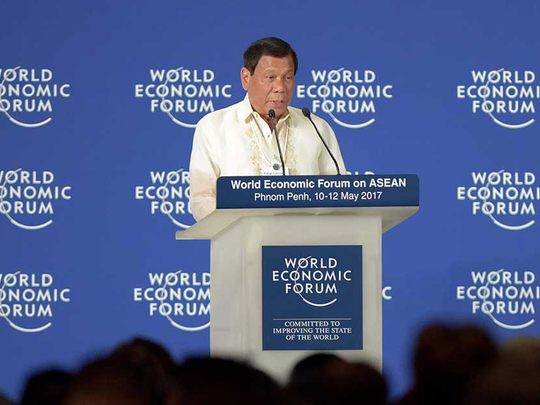
Manila: Philippine President Rodrigo Duterte called on fellow leaders of the 10 member countries of the Association of Southeast Asian Nations (ASEAN) to make the region drug and terror-free, prompting analysts to say he would easily get support from ASEAN leaders, but rights observers warned this could result in human rights violations in the region.
“All ASEAN leaders will agree with him,” political analyst Prospero de Vera, now a commissioner of the Commission on Higher Education, told Gulf News.
“This could make ASEAN leaders more silent on how ASEAN nations treat human rights issues,” said Joel Cruz, a rights activist. ASEAN observes the principle of non interference.
At the World Economic Forum in Cambodia, Duterte said, “We must reaffirm our commitment to realise a drug-free ASEAN community. We cannot turn a blind eye on the scourge of illegal drugs that threatens our youth and the future of our societies. We need to take a committed stand to dismantle and destroy the illegal drug trade apparatus.” The transcript of the statement reached Malacanang, Manila’s presidential palace, on Friday,
“Transnational crime threatens to undermine economic progress and development gaps threaten to hold us back from achieving the inclusive growth for our peoples,” Duterte warned.
Local and foreign rights groups have criticised Duterte’s bloody campaign against illegal drug trade.
It has killed 2,692 since July, Sen. Alan Peter Cayetano said before the United Nations Human Rights Council’s (UNHRC) Universal Period Review in Geneva last May 8.
About 9,342 homicide cases in the Philippines since July have been wrongfully added to the number of fatalities in the government’s anti-drug campaign, Cayetano said, adding the figure is “well within the average” since 11,000 to 14,000 homicide cases occurred yearly during the time of former President Benigno Aquino from 2004 to 2010.
Cayetano said he is willing to be imprisoned if his data is wrong. The figures were revealed for the first time.
Addressing 700 participants from 40 countries; and more than 450 business leaders from 15 industry sectors at the forum in Cambodia, Duterte called for trade and investments in technology and technological training for workers.
Explaining ASEAN’s potential, Duterte said, “ASEAN’s 10 member-states now stand firmly at the centre of the future of the Asia-Pacific region. ASEAN stands at the crossroads of global trade flows.”
Duterte, Cambodian Prime Minister Hun Sen, Vietnamese Prime Minister Nguyen Xuan Phuc and Lao Prime Minister Thongloun Sisoulith also addressed the forum.
ASEAN is composed of Brunei, Cambodia, Indonesia, Laos, Malaysia, Myanmar, Philippines, Singapore, Thailand, and Vietnam.
ASEAN is now the world’s sixth-largest economy, the world’s third-largest consumer base.
The Philippines will host the ASEAN leaders’ summit in November this year.









